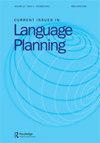The hidden face of public language policy: a case study from the UK
IF 1.8
1区 文学
Q2 EDUCATION & EDUCATIONAL RESEARCH
引用次数: 0
Abstract
ABSTRACT In which domains and for which language types does language legislation occur and how easy is it to identify it? The United Kingdom (UK) affords a good test bed to answer these questions since it is often considered to be lacking in strong public language policy due to, amongst other things, a lack of a coherent language policy across the UK and its devolved administrations and a perceived societal disinterest in languages. Through analysis of a corpus of primary and secondary legislation from the UK and its constituent jurisdictions that contain stipulations about language(s), this article shows that UK language legislation spans multiple domains, including public health and safety, law and crime, transport and the media. Whilst some of the legislation, such as the Welsh Language Acts, explicitly deals with language(s), the vast majority of the UK's legislation which contains provisions concerning language(s) is hidden in legislation which primarily concerns another domain. Although hidden, at times these language stipulations mark important landmarks in the status of languages. All this has consequences for the UK language policy landscape, potentially diminishing the perceived importance of languages in and to government and affecting policymakers' ability to collaborate across government in a coherent way.公共语言政策的隐藏面——以英国为例
本文章由计算机程序翻译,如有差异,请以英文原文为准。
求助全文
约1分钟内获得全文
求助全文
来源期刊

Current Issues in Language Planning
Multiple-
CiteScore
4.80
自引率
16.70%
发文量
26
期刊介绍:
The journal Current Issues in Language Planning provides major summative and thematic review studies spanning and focusing the disparate language policy and language planning literature related to: 1) polities and language planning and 2) issues in language planning. The journal publishes four issues per year, two on each subject area. The polity issues describe language policy and planning in various countries/regions/areas around the world, while the issues numbers are thematically based. The Current Issues in Language Planning does not normally accept individual studies falling outside this polity and thematic approach. Polity studies and thematic issues" papers in this journal may be self-nominated or invited contributions from acknowledged experts in the field.
 求助内容:
求助内容: 应助结果提醒方式:
应助结果提醒方式:


